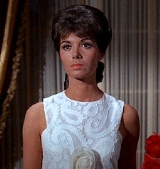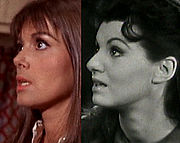
Linda Marsh
Encyclopedia
Linda Marsh, an American actress of film, stage, and television, was born in New York City
on February 8, 1939. She was nominated for a Golden Globe Award
for her performance in Elia Kazan
's 1963 film America, America
. The following year she played Ophelia in John Gielgud
's celebrated Broadway
production of Hamlet
starring Richard Burton
.
Marsh became one of the attractive young actresses who were regularly romanced by the stars of popular TV series, including The Man From U.N.C.L.E.
, The Wild Wild West
, It Takes a Thief, Hawaii Five-O
, and I Spy. In an unusual turnabout from the pattern typical for ingenues, Marsh underwent a series of rhinoplasties
following her early successes rather than changing her appearance before starting her career. Already a pretty woman, the ultimate result was exceptionally dramatic and opened the door to more glamorous parts in the later 1960s. She was a frequent guest star on television into the 1970s; her last credited roles were in 1979.
 Marsh's few film appearances included Che!
Marsh's few film appearances included Che!
and Freebie and the Bean
. In 1970 she starred in a notorious unreleased X-rated film called Stop! that was written and directed by Bill Gunn
, having told the press the year before that "...most young Hollywood actresses will do anything to get the right part – trade their charms, pose in the nude. But I can't separate my body from my mind. Cheesecake is a promotion device to get men to undress a girl optically. What I want is for people to accept all of me, the entire personality, not Linda Marsh from the neck down. Any other way, I don't want it."
Marsh won acclaim in Kazan's adaptation of his book "America, America" as a young woman who is betrothed to the story's ambitious main character but abandoned in his quest to emigrate from Greece to the United States. To play the characters in the epic film, which was loosely based on his uncle's life, the director said he chose actors who were Jewish (naming Marsh among them) or Greek because "all of them know oppression, they all have uncles from the 'Old World' and have an affectionate relationship towards their forbears." Her Ophelia received mixed notices, but Gielgud liked her performance and resisted efforts to recast the part despite holding more auditions during rehearsals.
New York City
New York is the most populous city in the United States and the center of the New York Metropolitan Area, one of the most populous metropolitan areas in the world. New York exerts a significant impact upon global commerce, finance, media, art, fashion, research, technology, education, and...
on February 8, 1939. She was nominated for a Golden Globe Award
Golden Globe Award
The Golden Globe Award is an accolade bestowed by the 93 members of the Hollywood Foreign Press Association recognizing excellence in film and television, both domestic and foreign...
for her performance in Elia Kazan
Elia Kazan
Elia Kazan was an American director and actor, described by the New York Times as "one of the most honored and influential directors in Broadway and Hollywood history". Born in Istanbul, the capital of the Ottoman Empire, to Greek parents originally from Kayseri in Anatolia, the family emigrated...
's 1963 film America, America
America, America
America, America is a 1963 American dramatic film directed, produced and written by Elia Kazan, from his own book.-Plot:...
. The following year she played Ophelia in John Gielgud
John Gielgud
Sir Arthur John Gielgud, OM, CH was an English actor, director, and producer. A descendant of the renowned Terry acting family, he achieved early international acclaim for his youthful, emotionally expressive Hamlet which broke box office records on Broadway in 1937...
's celebrated Broadway
Broadway theatre
Broadway theatre, commonly called simply Broadway, refers to theatrical performances presented in one of the 40 professional theatres with 500 or more seats located in the Theatre District centered along Broadway, and in Lincoln Center, in Manhattan in New York City...
production of Hamlet
Richard Burton's Hamlet
Richard Burton’s Hamlet is a common name for both the Broadway production of William Shakespeare's tragedy that played from April 9 through August 8 of 1964 at the Lunt-Fontanne Theatre, and for the filmed record of it that has been released theatrically and on home video.-Background:The production...
starring Richard Burton
Richard Burton
Richard Burton, CBE was a Welsh actor. He was nominated seven times for an Academy Award, six of which were for Best Actor in a Leading Role , and was a recipient of BAFTA, Golden Globe and Tony Awards for Best Actor. Although never trained as an actor, Burton was, at one time, the highest-paid...
.
Marsh became one of the attractive young actresses who were regularly romanced by the stars of popular TV series, including The Man From U.N.C.L.E.
The Man from U.N.C.L.E.
The Man from U.N.C.L.E. is an American television series that was broadcast on NBC from September 22, 1964, to January 15, 1968. It follows the exploits of two secret agents, played by Robert Vaughn and David McCallum, who work for a fictitious secret international espionage and law-enforcement...
, The Wild Wild West
The Wild Wild West
The Wild Wild West is an American television series that ran on CBS for four seasons from September 17, 1965 to April 4, 1969....
, It Takes a Thief, Hawaii Five-O
Hawaii Five-O
Hawaii Five-O is an American police procedural drama series produced by CBS Productions and Leonard Freeman. Set in Hawaii, the show originally aired for twelve seasons from 1968 to 1980, and continues in reruns. The show featured a fictional state police unit run by Detective Steve McGarrett,...
, and I Spy. In an unusual turnabout from the pattern typical for ingenues, Marsh underwent a series of rhinoplasties
Rhinoplasty
Rhinoplasty , also nose job, is a plastic surgery procedure for correcting and reconstructing the form, restoring the functions, and aesthetically enhancing the nose, by resolving nasal trauma , congenital defect, respiratory impediment, and a failed primary rhinoplasty...
following her early successes rather than changing her appearance before starting her career. Already a pretty woman, the ultimate result was exceptionally dramatic and opened the door to more glamorous parts in the later 1960s. She was a frequent guest star on television into the 1970s; her last credited roles were in 1979.

Che!
Che! is an American Biographical film starring Omar Sharif as Marxist revolutionary Ernesto "Che" Guevara. It follows Guevara from when he first landed in Cuba in 1956 to his death in Bolivia in 1967, although the film does not portray the formative pre-Cuban revolution sections of Che's life as...
and Freebie and the Bean
Freebie and The Bean
Freebie and The Bean is a 1974 action-comedy film about two San Francisco police detectives who have one goal in life, bringing down a local hijacking boss. The picture, a precursor to the buddy cop film genre popularized a decade later, stars James Caan, Alan Arkin, Loretta Swit and Valerie...
. In 1970 she starred in a notorious unreleased X-rated film called Stop! that was written and directed by Bill Gunn
Bill Gunn (writer)
Bill Gunn was an American playwright, novelist, actor and film director. His 1973 cult classic horror film Ganja and Hess was chosen as one of ten best American films of the decade at the Cannes Film Festival, 1973...
, having told the press the year before that "...most young Hollywood actresses will do anything to get the right part – trade their charms, pose in the nude. But I can't separate my body from my mind. Cheesecake is a promotion device to get men to undress a girl optically. What I want is for people to accept all of me, the entire personality, not Linda Marsh from the neck down. Any other way, I don't want it."
Marsh won acclaim in Kazan's adaptation of his book "America, America" as a young woman who is betrothed to the story's ambitious main character but abandoned in his quest to emigrate from Greece to the United States. To play the characters in the epic film, which was loosely based on his uncle's life, the director said he chose actors who were Jewish (naming Marsh among them) or Greek because "all of them know oppression, they all have uncles from the 'Old World' and have an affectionate relationship towards their forbears." Her Ophelia received mixed notices, but Gielgud liked her performance and resisted efforts to recast the part despite holding more auditions during rehearsals.

